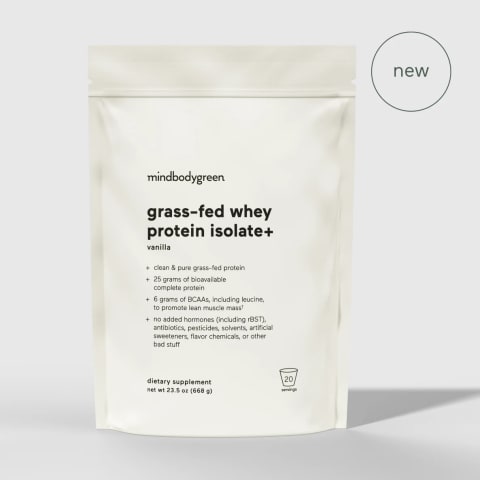Advertisement
How To Firm Your Skin While Working Out According To Research & Medical Professionals


For years there was a persistent, and rather annoying, myth that claimed exercise aged the face.
Certainly, there are workout habits that may contribute to premature aging of the skin. The most notable is not wearing SPF and other forms of sun protection when running, hiking, or during other outdoor workouts. And some experts note that over-exercising can exacerbate gravitational wrinkles or contribute to a gaunt “runners face.”
However, the reality is that the research continues to show that exercise is, in fact, good for the skin. For example, there is data showing that exercise can actually strengthen your mitochondria1 (the powerhouse of your skin cells, and well, every cell), improve circulation2, reduce stress,3 and aid sleep4—all of which are great for skin health.
And just like there are workout habits that can damage skin, there are also workout habits that can improve skin.
So it’s about whether or not you should workout, but rather how you should work out.
Focus on resistance training
A study published in Scientific Reports found that strength training can actually improve skin firmness5. The researchers divided 56 healthy but inactive middle-aged women into two groups: one group completed aerobic training, and the other participated in resistance training twice a day for 16 weeks.
Both types of exercise plans improved skin elasticity and upper dermal structure; however, only resistance training was found to increase dermal thickness—and this structural integrity is crucial for supple, firm skin.
Researchers specifically found molecules called biglycans in these participants' blood samples, which are linked to skin firmness6. On the flip side, they found a decrease in molecules that inhibit biglycans, like cytokines.
So if skin benefits are what you’re after, consider adding in some strength training to your workout routine.
Prioritizing protein intake
Amino acids are the building blocks of proteins, like those found in both muscles and skin. We get amino acids from dietary proteins. Consuming an adequate amount of proteins is not only essential for building new muscles, but also supplying the skin with dermal proteins such as collagen, elastin, and keratin.
One way to optimize the skin benefits of protein consumption is to supplement with a collagen powder. While collagen is best known for its skin-related benefits, the peptides have perks far beyond keeping your complexion tight.
While collagen is not a complete protein, it still delivers plenty of amino acids that can contribute to muscle mass. In fact, in one small clinical study, men who took collagen daily while participating in an exercise program gained more muscle mass7 than those who only completed the exercise program.
As for skin, collagen supplements have been shown to support skin elasticity and dermal collagen density8. Clinical studies on collagen supplementation and skin hydration show that with regular use, it supports your skin's hydration levels. And finally, clinical research has shown that collagen can support skin elasticity9 and potentially make fine lines appear smaller.
Shift your mindset
Mindset is a powerful tool, notes naturopathic doctor Jessica Maloh, N.D., in this TikTok post. In it she explains the now famous hotel cleaner exercise study10 that suggests perception of exercise could improve outcomes.
“We know there are many benefits of exercise including recent research that suggests both consistent aerobic and resistance exercise [noted above] can improve skin elasticity,” she shared with us. “But let’s take it a step further with a holistic perspective in mind—can some of the effects of regular physical activity be moderated by our mindset?”
She goes on to explain the logistics of the study: “In one study with a group of hotel room attendants, some were told that the work they do meets the recommendations for an active lifestyle and were given examples of how their work serves as good exercise,” she explains. “The others in the study were not provided this information, and served as the control group.
When the researchers want to check in with the individuals a month later, they found that this mindset shift had changed the course of their work: “The group that were told their work counted as exercise—even though their workload didn’t change—saw improvements in a variety of parameters including weight, blood pressure and body fat percentage,” she says.
Maloh suggests that the beliefs we carry while working out may help contribute to our outcomes: “So while more research is needed, this suggests that our beliefs about our daily physical activities and bringing awareness to them, may help facilitate more of the many benefits associated with exercise,” she says.
The takeaway
Everything we do—from how much we sleep to what we eat—has the ability to impact our skin health, especially with age. And working out has the profound ability to influence facial aging, for better or worse. However, with the right tweaks it can make the complexion firmer, brighter, and more youthful.
10 Sources
- https://www.jaad.org/article/S0190-9622(21)02156-3/fulltext
- https://www.ncbi.nlm.nih.gov/pmc/articles/PMC4551211/
- https://www.ncbi.nlm.nih.gov/pmc/articles/PMC4013452/
- https://www.ncbi.nlm.nih.gov/pmc/articles/PMC5385214/
- https://www.nature.com/articles/s41598-023-37207-9
- https://www.ncbi.nlm.nih.gov/pmc/articles/PMC6540032/
- https://www.ncbi.nlm.nih.gov/pmc/articles/PMC4594048/
- https://jddonline.com/articles/dermatology/S1545961619P0009X
- https://www.ncbi.nlm.nih.gov/pubmed/23949208
- https://pubmed.ncbi.nlm.nih.gov/17425538/












